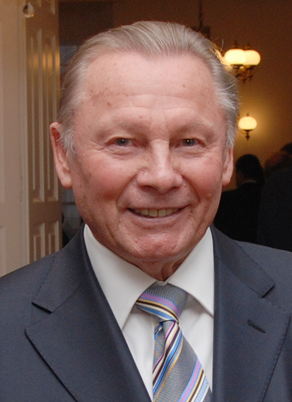|
Party Of Civic Understanding
The Party of Civic Understanding ( sk, Strana občianskeho porozumenia, SOP) was a centre-left political party in Slovakia between 1998 and 2003. Between 1998 and 2002 the party was part of the coalition government led by Mikuláš Dzurinda, with the founder of the party, Rudolf Schuster, being elected President of Slovakia in 1999. In government the party lost support and after the 2002 election had no seats in parliament. The party dissolved on the 1 March 2003 and recommended its members join Direction – Social Democracy (SMER). Foundation and 1998 election The Party of Civic Understanding was founded in April 1998 by the Mayor of Košice, Rudolf Schuster. Members of the new party included the former Foreign Minister Pavol Hamžík, among other prominent Slovak figures. The new party was aided by favourable publicity from the Markíza television station. The Party of Civic Understanding aimed for left leaning voters from eastern Slovakia and disillusioned supporters of the ... [...More Info...] [...Related Items...] OR: [Wikipedia] [Google] [Baidu] |
Pavol Hamžík
Pavol Hamžík (born 20 August 1954) is a former Foreign Minister of Slovakia from 1996 to 1997 in cabinet of Vladimír Mečiar and also member of government of prime minister Mikuláš Dzurinda. He is currently the foreign policy advisor of Robert Fico. He studied law at Comenius University in Bratislava Comenius University in Bratislava ( sk, Univerzita Komenského v Bratislave) is the largest university in Slovakia, with most of its faculties located in Bratislava. It was founded in 1919, shortly after the creation of Czechoslovakia. It is name ..., finished in 1978. Hamžík also studied diplomacy in Moscow (1989–1991). Since May 2009 he has been the Slovak ambassador in Ukraine. References 1954 births Living people Foreign Ministers of Slovakia People from Trenčín Ambassadors of Slovakia to Ukraine Comenius University alumni Ambassadors of Slovakia to Hungary Members of the National Council (Slovakia) 1998-2002 {{Slovakia-politician-stub ... [...More Info...] [...Related Items...] OR: [Wikipedia] [Google] [Baidu] |
Party Of The Democratic Left (Slovakia)
The Party of the Democratic Left ( sk, Strana demokratickej ľavice, SDĽ) was a social-democratic political party in Slovakia from 1990 to 2004. It was founded in 1990 out of the Communist Party of Slovakia. History At the party congress on 14 December 1991 in Trenčín, the congress adopted new party constitution and decided to leave federation of Communist Party of Czecho-Slovakia, due to disputes with the Communist Party of Bohemia and Moravia and changing situation in the Czech and Slovak Federative Republic. Congress reconfirmed Peter Weiss as party chairman. From 1994 to 1997, SDĽ was a member of a coalition called "Common Choice" () that gained 10.18% (18 seats) in the Slovak parliament. They did not form a part of the government. Since the 2002 elections, it has had no place in the Slovak legislature. It was a member of the Party of European Socialists and the Socialist International. On 4 December 2004, the party membership voted to merge with Direction – Social ... [...More Info...] [...Related Items...] OR: [Wikipedia] [Google] [Baidu] |
Slovak Democratic Coalition
The Slovak Democratic Coalition ( sk, Slovenská demokratická koalícia, SDK) was a political party in Slovakia, which existed from 1998 to 2002. SDK coalition The SDK was founded on 3 July 1997 as an electoral coalition, from the five political parties, namely Democratic Union, Christian Democratic Movement, Democratic Party, Social Democratic Party of Slovakia and Green Party in Slovakia. It had great chance to win parliament elections in 1998. The leaders of this coalition were chiefs of respective parties, with Mikuláš Dzurinda as its speaker. The ruling government coalition with the Movement for a Democratic Slovakia as a leader, in response passed a law, which restricted candidature of such coalitions. As a reaction of passing an "anti-coalition" law, the SDK transferred itself from electoral coalition into a political party with 150 members, with each one being a candidate into the parliament. SDK in government Although Movement for a Democratic Slovakia narrowl ... [...More Info...] [...Related Items...] OR: [Wikipedia] [Google] [Baidu] |
Slovenská Televízia
Slovenská televízia (; "Slovak Television"; STV) was a state-owned public television organisation in Slovakia. It was created in 1991 as the Slovak part of the former Czechoslovak Television and was headquartered in Bratislava. It was funded from a combination of television licence fees, advertising, and government funding. It ceased to existed on 1 January 2011, when it was merged with the state-owned public radio organisation Slovenský rozhlas ("Slovak Radio") to create Rozhlas a televízia Slovenska ("Radio and Television of Slovakia"). STV was a regular member of the European Broadcasting Union. History The establishment of STV as an independent institution happened on 1 July 1991, after a law by the Slovak National Council related to the independence of Slovakia from Czechoslovakia. However, its history dates back to November 1956, when Czechoslovak Television, then under socialist regime, established a television studio in Bratislava as a test transmission. Regular ... [...More Info...] [...Related Items...] OR: [Wikipedia] [Google] [Baidu] |
1998 Slovak Parliamentary Election
Parliamentary elections were held in Slovakia on 25 and 26 September 1998. Nohlen, D & Stöver, P (2010) ''Elections in Europe: A data handbook'', p1747 The elections resulted in the defeat of the Vladimír Mečiar government and the election of Mikuláš Dzurinda as Prime Minister. His party, the Slovak Democratic Coalition formed a coalition government with the Party of the Democratic Left, Party of the Hungarian Coalition, and the Party of Civic Understanding. Participating parties Results Notes References {{Slovak elections Parliamentary elections in Slovakia Slovakia Slovakia (; sk, Slovensko ), officially the Slovak Republic ( sk, Slovenská republika, links=no ), is a landlocked country in Central Europe. It is bordered by Poland to the north, Ukraine to the east, Hungary to the south, Austria to the s ... 1998 in Slovakia September 1998 events in Europe ... [...More Info...] [...Related Items...] OR: [Wikipedia] [Google] [Baidu] |
The Slovak Spectator
''The Slovak Spectator'' (or in abbreviated form ''Slovak Spectator'') is Slovakia's English-language newspaper. History and profile The debut issue of ''The Slovak Spectator'' hit newsstands across Slovakia on 1 March, 1995. The newspaper was founded by four Americans: Rick Zednik, Richard Lewis, Eric Koomen and Daniel J. Stoll. Currently, only Koomen and Stoll are owners along with the largest media company in Slovakia, Petit Press, which also owns ''SME'', ''Új Szó'', ''Korzár'' and various regional My noviny newspapers. ''The Slovak Spectator'' is published by The Rock, s.r.o. publishing house and covers local news, culture and business. The company also publishes four special publications that appear throughout the year, including the ''Spectacular Slovakia'' travel guide, the ''Book of Lists'' business directory, and comprehensive guides to local real estate, investment environment and human resources. Its target group includes foreigners living and working in Slovaki ... [...More Info...] [...Related Items...] OR: [Wikipedia] [Google] [Baidu] |
Vladimír Mečiar
Vladimír Mečiar (; born 26 July 1942) is a Slovak politician who served as the prime minister of Slovakia three times, from 1990 to 1991, from 1992 to 1994 and from 1994 to 1998. He was the leader of the People's Party - Movement for a Democratic Slovakia (ĽS-HZDS). Mečiar led Slovakia during the dissolution of Czechoslovakia in 1992–93 and was one of the leading presidential candidates in Slovakia in 1999 and 2004. He has been criticized by his opponents as well as by Western political organisations for having an autocratic style of administration and for his connections to organized crime and his years in government became infamously known as ''Mečiarizmus'' (Mečiarism - spin off from Communism, due to its autocracy). Czechoslovakia Mečiar was born in Detva in 1942 as the eldest of four boys. His father was a tailor, and his mother a housewife. His wife Margita is a medical doctor and they have three children. Starting in the Communist Party of Slovakia, the onl ... [...More Info...] [...Related Items...] OR: [Wikipedia] [Google] [Baidu] |
Polarization (politics)
Political polarization (spelled ''polarisation'' in British English) is the divergence of political attitudes away from the center, towards ideological extremes. Most discussions of polarization in political science consider polarization in the context of political parties and democratic systems of government. In two-party systems, political polarization usually embodies the tension of its binary political ideologies and partisan identities. However, some political scientists assert that contemporary polarization depends less on policy differences on a left and right scale but increasingly on other divisions such as religious against secular, nationalist against globalist, traditional against modern, or rural against urban. Polarization is associated with the process of politicization. Scholars distinguish between ideological polarization (differences between the policy positions) and affective polarization (an emotional dislike and distrust of political out-groups). Definitions ... [...More Info...] [...Related Items...] OR: [Wikipedia] [Google] [Baidu] |
NATO
The North Atlantic Treaty Organization (NATO, ; french: Organisation du traité de l'Atlantique nord, ), also called the North Atlantic Alliance, is an intergovernmental military alliance between 30 member states – 28 European and two North American. Established in the aftermath of World War II, the organization implemented the North Atlantic Treaty, signed in Washington, D.C., on 4 April 1949. NATO is a collective security system: its independent member states agree to defend each other against attacks by third parties. During the Cold War, NATO operated as a check on the perceived threat posed by the Soviet Union. The alliance remained in place after the dissolution of the Soviet Union and has been involved in military operations in the Balkans, the Middle East, South Asia, and Africa. The organization's motto is ''animus in consulendo liber'' (Latin for "a mind unfettered in deliberation"). NATO's main headquarters are located in Brussels, Belgium, while NATO ... [...More Info...] [...Related Items...] OR: [Wikipedia] [Google] [Baidu] |
European Union
The European Union (EU) is a supranational political and economic union of member states that are located primarily in Europe. The union has a total area of and an estimated total population of about 447million. The EU has often been described as a '' sui generis'' political entity (without precedent or comparison) combining the characteristics of both a federation and a confederation. Containing 5.8per cent of the world population in 2020, the EU generated a nominal gross domestic product (GDP) of around trillion in 2021, constituting approximately 18per cent of global nominal GDP. Additionally, all EU states but Bulgaria have a very high Human Development Index according to the United Nations Development Programme. Its cornerstone, the Customs Union, paved the way to establishing an internal single market based on standardised legal framework and legislation that applies in all member states in those matters, and only those matters, where the states have agreed to act ... [...More Info...] [...Related Items...] OR: [Wikipedia] [Google] [Baidu] |
People's Party – Movement For A Democratic Slovakia
Former headquarters of the ĽS-HZDS political party at Tomášikova Street 32/A in Bratislava The Movement for a Democratic Slovakia ( sk, Hnutie za demokratické Slovensko, HZDS) was a national-populist political party in Slovakia. The party is commonly considered as authoritarian and illiberal. During 1992–1998, HDZS was the leading party of the government, led by Prime Minister Vladimír Mečiar. The party rule was characterized by a fundamental violation of civil liberties, rule of law and a halt to post-communist economic reforms, European integration. After 1998 parliamentary election, the party remained in opposition for two terms still as the strongest party. In opposition, HZDS moved its positions from Euroscepticism to pro-Europeanism and joined European Democratic Party, although it did not profess EDP's liberal ideology. In the 2006 parliamentary election, the party dropped to 5th place and became a junior partner in the Fico's First Cabinet. In 2010 parliame ... [...More Info...] [...Related Items...] OR: [Wikipedia] [Google] [Baidu] |


